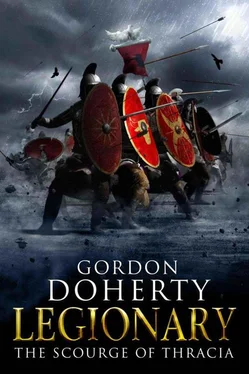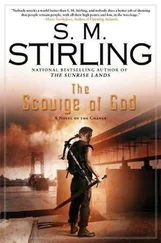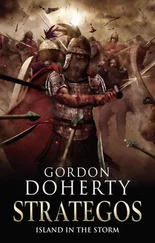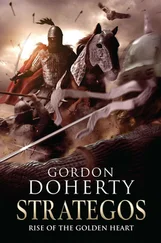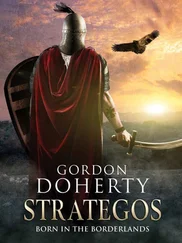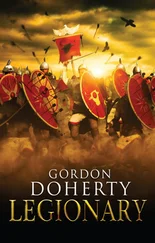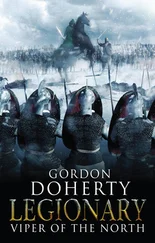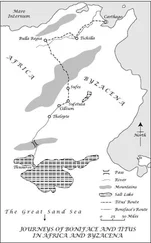Gordon Doherty - The Scourge of Thracia
Здесь есть возможность читать онлайн «Gordon Doherty - The Scourge of Thracia» весь текст электронной книги совершенно бесплатно (целиком полную версию без сокращений). В некоторых случаях можно слушать аудио, скачать через торрент в формате fb2 и присутствует краткое содержание. Год выпуска: 2015, Издательство: www.gordondoherty.co.uk, Жанр: Исторические приключения, на английском языке. Описание произведения, (предисловие) а так же отзывы посетителей доступны на портале библиотеки ЛибКат.
- Название:The Scourge of Thracia
- Автор:
- Издательство:www.gordondoherty.co.uk
- Жанр:
- Год:2015
- ISBN:нет данных
- Рейтинг книги:5 / 5. Голосов: 1
-
Избранное:Добавить в избранное
- Отзывы:
-
Ваша оценка:
- 100
- 1
- 2
- 3
- 4
- 5
The Scourge of Thracia: краткое содержание, описание и аннотация
Предлагаем к чтению аннотацию, описание, краткое содержание или предисловие (зависит от того, что написал сам автор книги «The Scourge of Thracia»). Если вы не нашли необходимую информацию о книге — напишите в комментариях, мы постараемся отыскать её.
The Scourge of Thracia — читать онлайн бесплатно полную книгу (весь текст) целиком
Ниже представлен текст книги, разбитый по страницам. Система сохранения места последней прочитанной страницы, позволяет с удобством читать онлайн бесплатно книгу «The Scourge of Thracia», без необходимости каждый раз заново искать на чём Вы остановились. Поставьте закладку, и сможете в любой момент перейти на страницу, на которой закончили чтение.
Интервал:
Закладка:
Just then, a faint scrabbling of dust and pebbles sounded behind him. He swung round to see his sixth scout climb up from the near-sheer mountain-side and onto this rocky outcrop. The scout scuttled over to him, sure to stay out of view of the Roman fort. ‘They are changing the watch, Iudex, ’ he said, stooping a little lower in genuflection.
Fritigern’s eyes widened to match the look of the scout. It was time. He heard the distant calls of the Roman centurions and the faint rumble of boots as the legionaries atop the wall filed off the battlements to be replaced by a fresh watch. This was the perfect time for an assault, he grinned, then edged his head to the side of the cairn and cast his eyes along the mountain ridge towards the fort. The long-grass and shrubs on the slopes either side of the path writhed in the wind, fleetingly exposing his vanguard of soldiers. A hundred men. They moved like insects, bellies pressed to the steep sides of the ridge, shields strapped to their backs, remaining unseen so far and moving only when they were sure the Romans would not spot them. In previous attacks, his soldiers had tried to charge along the ridge path and overwhelm the fort’s north wall head on. But each time they had been sighted a good half-mile away, and the Romans had ample time to prepare a defence against such a narrow-fronted assault. This time, they would be granted no such luxury. His lips played with a grin, tempered by the knowledge that many more of his kind would die in today’s efforts. And so it has always been, he thought, fending off his doubts.
He took up his spear, adorned with a strip of sapphire-blue silk emblazoned with a black hawk, then stood tall, chopping it to and fro like an axe. ‘Rise!’ he bellowed, the baritone cry echoing across the granite mountains like that of a war-god. At once, it brought the hundred tall, fair-haired hidden Goths scrambling up the ridge-sides and onto the path, just a handful of paces from the Roman fort’s northern wall. They came together, swung their shields round from their backs and, just as he had trained them to, they formed a mini shield-wall, breaking to allow Gothic archers to rise and loose short, sharp volleys at the wall’s unprepared defenders. Legionaries lurched and screamed as the arrows found throats and eyes, their bodies toppling from the stockade, gouts of blood staining the air as they crashed onto the ground before the Goths or tumbled down the sides of the ridge, limbs flailing. A handful of Goths broke away, drawing out grappling irons and lengths of rope from their belts. They swung these ropes like slings then hurled the irons at the timber-stake battlements, before wrenching them tight and scaling the wall.
Fritigern watched with keen eyes. The Romans’ usual iron-discipline was gone, he realised. Instead of issuing thick volleys of darts and javelins, they were panicked, with many dropping their shields and struggling to pull the grappling hooks free. These legionaries were quickly shot by the Gothic archers. Then the first of his climbers reached the walltop. These men were lost in the madness of battle, some leaping onto the battlements with great swings of their longswords, heedless of their own mortality. They cut through legionaries’ arms and torsos, spraying fresh blood on the timber palisade. But one by one, they were cut down, as he knew they would be, having served their noble purpose well. The final few climbers fought their last on the wall top and the packs of shielded Gothic archers suddenly found themselves under the full attention of the Roman archers and javelin-throwers. It seemed that the Gothic attack was about to be repelled.
Then, the ridge echoed with the wail of a Gothic war horn.
Fritigern clenched a fist in anticipation of victory, seeing the Roman defenders slow then freeze in their melee with his vanguard. Every one of them looked beyond, to what was coming up the ridge path from the north at great haste. Fritigern did likewise, turning to see his wing of galloping mail and leather-clad riders and the horde of equally well-armoured Gothic spearmen and archers running behind them. A jostling sea of blades, helms and blonde locks. A serpent of warriors, snaking as far as the eye could see along the lofty ridge path. Two thousand men, he enthused, surely enough to break this cursed blockade at last.
He slid down the scree from the cairn and onto the path. The foremost Gothic rider brought with him a riderless horse. Seeing his Iudex, he slowed to a canter. Fritigern held out a hand and grabbed the reins from the rider, hauled himself onto the saddle, then heeled the beast forward. ‘Ya!’ he cried, sweeping his longsword aloft. ‘Take the walls,’ he yelled as his forces swept ahead of him in a great din of war cries and on to press against the base of the fort wall. They carried with them three tall ladders, which they swung up to clatter into place against the battlements. Moments later, hundreds of Gothic warriors were racing up the rungs. Showers of arrows and spears thrown from the Gothic mass punched back the thinning band of legionaries atop the wall, and soon the defenders were but small pockets of men, fighting in vain to push back the ladders laden with warriors who were now only a few rungs away from the top.
‘Yes,’ Fritigern whispered, then filled his lungs to bellow: ‘Yes! Seize the battleme-’
His cry was cut short by the keening of a buccina. In moments, the walltop flooded with a fresh batch of silver-clad legionaries. Two more centuries. . then a third. He saw that they brought with them long poles fitted with steel hooks at the end. These swathes of legionaries then hooked the poles to the ladder-tops, gradually but surely forcing the ladders back from the walls until they teetered, near-vertical. A heartbeat later, the pass filled with shrill screams as the most central of the ladders toppled backwards, tossing armour-laden Goths to the ground where many perished with the stark sound of cracking of skulls and vertebrae, and many more were injured, crushed under the weight of their falling comrades. The climbers on the ladders close to the corners of the fort met a grimmer end, these ladders swinging back not onto the ridge path but out over the edges of the ridge, ladders and men tumbling down the jagged slopes in a tumult of dust, blood, snapping timber and bone and screaming. In moments, the seemingly inexorable Gothic advance had stalled — the two thousand stranded at the foot of the walls with no means of scaling the sturdy stockade. A peculiar silence descended for but an instant, before the battlements rippled with silver as a myriad darts and javelins were raised and the stretching of hundreds of Roman bowstrings sounded.
‘ Loose! ’ the centurion up there yelled.
The smack of iron arrowheads and javelins on crumpling armour and soft flesh seemed never ending. Gothic warriors fell in their hundreds. Blood-spray was carried by the whistling wind, up the Shipka Pass until Fritigern could taste its coppery tang on his lips.
‘Fall back,’ he snarled, seeing the legionaries ready for another volley. ‘ Fall back! ’
The Gothic camp lay just north of the Haemus Mountains. It was a vast sprawl of tents and torches and home to more than a hundred thousand souls; the great tribes of the Thervingi and the Greuthingi along with many ragged bands who had previously associated with neither. All now stood together as the Gothic Alliance. Near the heart of the camp, a small circle of men sat around an open fire under a cloudy night sky and a waning moon. They were dressed in leather armour and wore furs on their shoulders. Fritigern sighed as he eyed this collection of reiks across the fire. This council of noblemen was his to command, yet they looked upon him like scornful fathers. Through the swirling air and dancing sparks, he saw expressions of fury and despair, narrowed eyes laced with cunning and thin lips on the edge of yet another recalcitrant outburst.
Читать дальшеИнтервал:
Закладка:
Похожие книги на «The Scourge of Thracia»
Представляем Вашему вниманию похожие книги на «The Scourge of Thracia» списком для выбора. Мы отобрали схожую по названию и смыслу литературу в надежде предоставить читателям больше вариантов отыскать новые, интересные, ещё непрочитанные произведения.
Обсуждение, отзывы о книге «The Scourge of Thracia» и просто собственные мнения читателей. Оставьте ваши комментарии, напишите, что Вы думаете о произведении, его смысле или главных героях. Укажите что конкретно понравилось, а что нет, и почему Вы так считаете.
